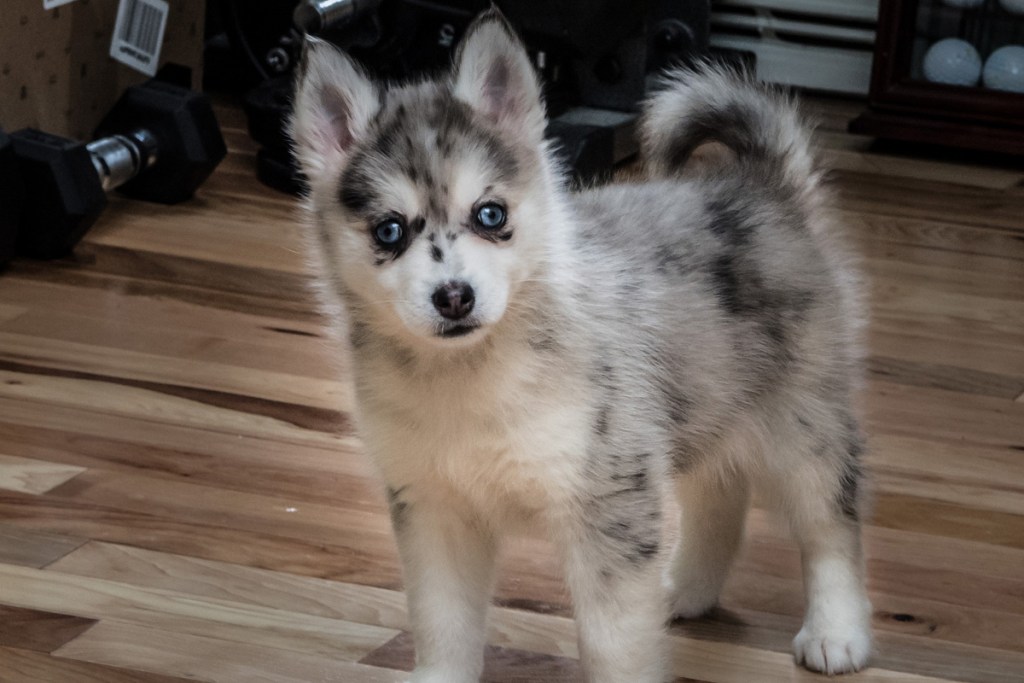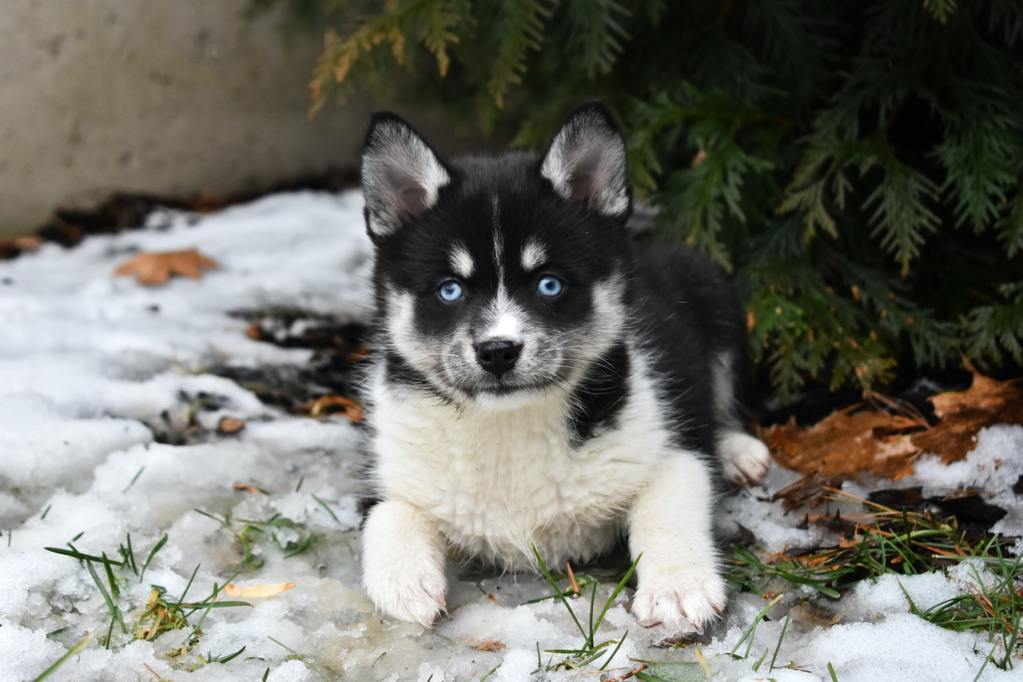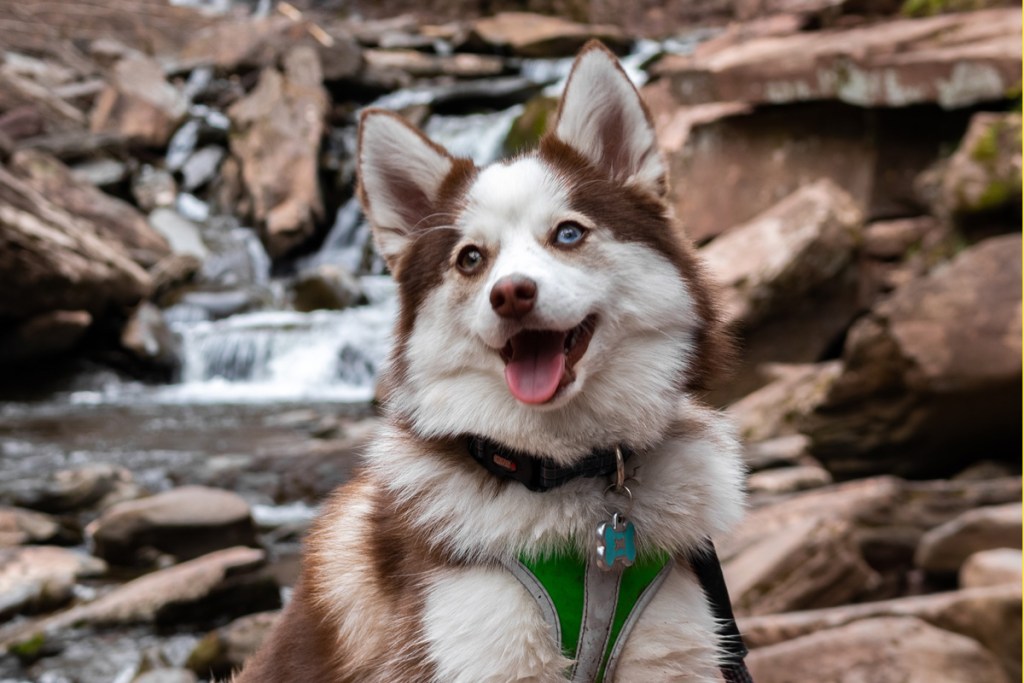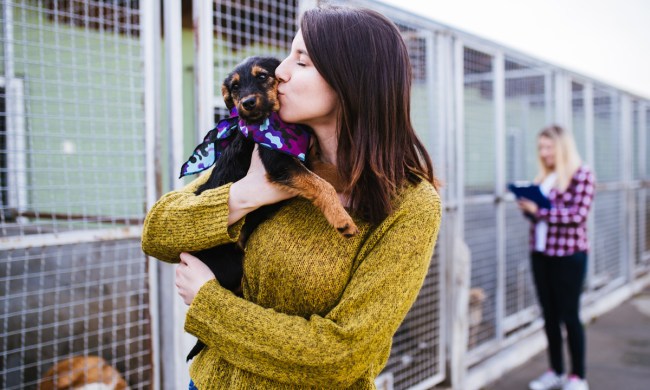The Pomsky is one of the newest and most popular designer dog breeds, largely thanks to the sharing of puppy photos and videos on social media. With their fluffy double coats, pricked ears, and almond-shaped eyes, it’s easy to see how people fall in love with these fluffballs. However, puppies grow into adult dogs, and it’s important to know what to expect when choosing the right dog for the family. So, is a Pomsky– the result of breeding a female Siberian husky with a male Pomeranian –a good family dog? Here’s everything you need to know about the breed (aside from how cute they are, of course).
How big will a Pomsky get?
According to the Pomsky Club of America (PCA), reputable breeders cannot guarantee the size of a full-grown Pomsky. They tend to range from “small to medium,” which varies from 15 to 25 pounds. Breed experts at the PCA say that, as they continue to perfect the breed lines, they are seeing larger numbers of smaller puppies per litter.

What will an adult Pomsky look like? How big do these dogs tend to get when full-grown?
Pomskies have a Husky-like appearance, including the coloring and markings of the Husky, but the fluffy coat of the Pomeranian. Their coats can be a mixture of black, white, brown, and gray, while their eyes can be blue, brown, or a combination of the two. According to experts at the International Pomsky Association (IPA), this breed always has a double coat that can vary in length. Breeders say it’s impossible to predict in puppyhood which type of coat a dog has inherited.

What is the Pomsky personality and disposition like? Do they take after the Husky or the Pom?
All Pomskies exhibit some traits of the Pomeranian and some of the Siberian Husky. So, let’s take a look at the temperaments of the parents:
Siberian huskies
The Siberian Husky Club of America describes these dogs as alert, eager to please, and adaptable. They are intelligent and can be independent and stubborn. Huskies thrive on human companionship and tend to get along great with children and other dogs. They are an active, athletic breed that needs lots of exercise.
Pomeranians
As one of the most popular toy breeds, Pomeranians are described by the American Kennel Club as alert, intelligent, and great with older kids. Children who interact with the pet should old enough to know the difference between a dog and a toy. Poms need to be trained to walk on a leash early and can be challenging when it comes to house training. While they are great lapdogs, they do enjoy going for walks and love to run and play.
Traits passed along to Pomskies
Pomeranians and huskies share several personality traits that are usually passed along to their Pomsky offspring. These include intelligence, playfulness, confidence, and a loving nature. Breed experts at the IPA say that, while Pomskies love to learn, some are easier to train than others. Housebreaking is not any more of an issue with Pomskies than other breeds, but some dogs take to it faster than others.
Like their parents, Pomskies can be vocal. And while they’re not yappy dogs, they do make a range of sounds to express their feelings. According to experts at the PCA, Pomskies don’t have the same independent streak as huskies and tend to become attached to family members without being as needy as Pomeranians.
What health issues do Pomskies tend to face?
Breed experts at the PCA say that, so far, they haven’t seen any new health issues arising in this breed; but since it’s such a new breed, they’re still learning. However, Pomskies are still genetically predisposed to health issues inherited from their parents, including allergies, hip dysplasia, dislocated knees, eye problems, epilepsy, heart disease, and skin problems.
So, is a Pomsky a good family dog? That depends on the family!
They can make wonderful additions to families willing to provide the right amount of exercise and ongoing training. These dogs offer all the love and playfulness of the husky while being small enough not to knock over young children. As with any animal companions, young children need to be supervised when interacting with Pomskies. Family members must be willing to provide lots of interactive playtime to these dogs, otherwise they can become bored and destructive.
It’s also important to maintain a regular exercise routine to keep these pups healthy and happy. They are escape artists and can be turned loose only in a securely fenced-in yard. And because they are big shedders, Pomskies are high maintenance in terms of coat care. They are not a good choice if anyone in the family suffers from allergies.
When it comes to choosing a Pomsky, it’s essential to avoid scams and irresponsible breeders who put profit before the health and well-being of their dogs. You can find a reputable breeder through the PCA or the IPA. Members of these groups are required to follow a strict code of ethics and are interested in breeding healthy pups. If you’d prefer to adopt or foster a Pomsky, you can reach out to the IPA for information on available dogs. Who knows– you might fall in love and end up adopting a Pomsky in need of a home.




